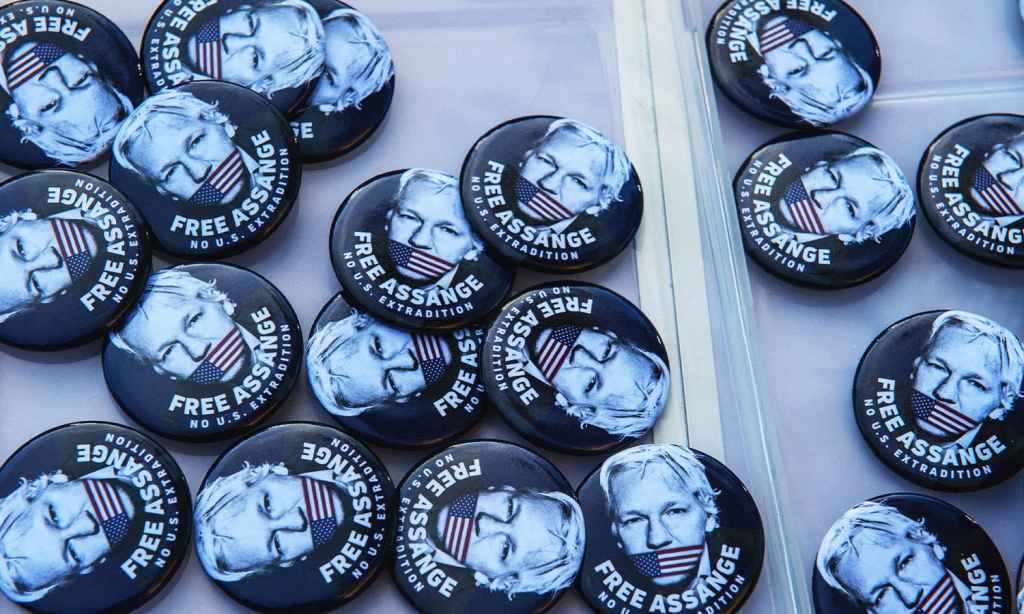Oh, Julian Assange — one of the few people to actually face consequences for the wars in Iraq and Afghanistan. Not for any questionable military actions, mind you, but for daring to reveal to the world exactly what our governments were up to in the Middle East.
For the crime of, essentially, journalism, Assange has been chased around the world, dodging prosecutions left right and centre, and languishing in the Ecuadorean Embassy in London for seven years.
Julian Assange is currently residing in Belmarsh Prison in London, but he may not be there for long. The UK Home Secretary made the decision over the weekend to approve his extradition to the US where he is wanted on espionage charges and faces, potentially, 175 years in jail.
This is despite the fact that last year a UK court rejected the extradition claims of the US to bring Assange to the country. That decision was overturned last month by the UK Supreme Court which then passed the decision to Home Secretary Priti Patel. Satisfied that the US extradition request was legal and that assurances had been made that he would not face the death penalty, Patel gave the green light.
It’s the latest in a saga that stretches back over a decade and could be coming to its conclusion soon. Assange, head of the free information site WikiLeaks, published 250,000 US diplomatic communications along with video evidence of a US air attack on civilians in Baghdad. All of it was pretty horrific and for his efforts, Assange has been on the run ever since.
Given Australia is his home country and we’ve got a shiny new government, you would have thought that we might be doing, well, something about it.
What Australia Is Doing About Julian Assange
When questioned on the topic on Monday, PM Anthony Albanese said that he would pursue the issue “diplomatically and appropriately with our partners.” He also said that he stood by previous comments on Assange.
Where he’s spoken out previously has been decidedly more progressive than the previous government. In December of last year, Albanese told ABC Radio Northern Tasmania that “enough is enough.”
“I do not see what purpose is served by the ongoing pursuit of Mr Assange. He is an Australian citizen as well. And with that should come an obligation of the Australian government to ensure that he receives appropriate support,” he said.
John Shipton, Assange’s father, said in April that he has high hopes for the new government in getting his son out of this mess and that Albanese has personally assured him he would do “whatever he can” to help.
That being said, new Foreign Affairs Minister Penny Wong released a statement in response to the UK Home Office’s decision, saying that “Australia is not a party to Mr Assange’s case, nor can the Australian government intervene in the legal matters of another country”.
“We will continue to convey our expectations that Mr Assange is entitled to due process, humane and fair treatment, access to proper medical care, and access to his legal team,” the statement continued.
“The Australian Government has been clear in our view that Mr Assange’s case has dragged on for too long and that it should be brought to a close.
“We will continue to express this view to the governments of the United Kingdom and United States”.
None of that sounds particularly strong and it’s clear that unless this is made a key priority by the Australian government, the UK and the US will likely decide Assange’s fate.
Former Foreign Minister Bobb Carr has written that he believes if Albanese demanded the return of Assange from US President Joe Biden, he would have “every reason” to agree. Barack Obama was able to get the 35-year sentence of Chelsea Manning, the woman who actually leaked much of the information to Assange, commuted at the end of his presidency. Given Biden is pretty keen to wash his hands of the bloodshed brought about by previous administrations in the Middle East, our position as a key strategic ally may just tip the scales.
On the other hand, The US has previously made agreements that Assange, if he is extradited and sentenced in the US, could apply to serve his time in an Australian prison if he so chooses. In a sad way, this could end up being the eventual smoothest option for bringing him home.
Assange’s team has said that they will appeal the Home Office decision on the ground of free speech and that the decision is politically motivated.
Read more stories from The Latch and subscribe to our email newsletter.







